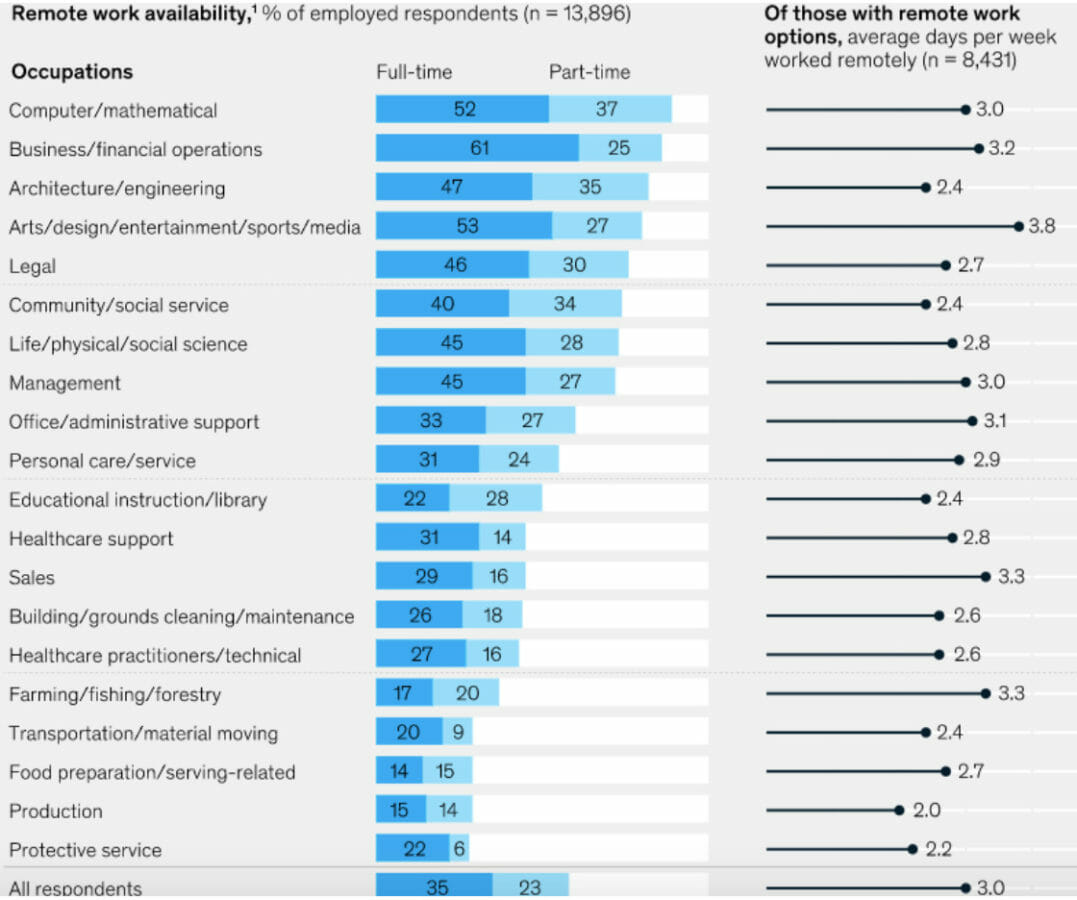In the last couple of years many industries have shifted to greater flexible working arrangements, with employees seeing improvements to their mental health and wellbeing as well as the ability to spend more time with their children amongst some of the benefits of this arrangement.
According to a recently published McKinsey report, 87% of workers who were offered at least some remote work embraced the opportunity and spend an average of three days a week working from home.
Clearly the majority of people want greater flexibility at work and jump at the chance of having it.
However, many other industries and employees that were termed ‘frontline workers’ during the pandemic have had to travel into work all this time. Largely, these industries have not seen the kind of flexibility that many of us have been able to enjoy for the last few years. These industries and individuals have also not had an improvement to their working pay for several years despite inflation, so they are actually worse off despite the fact that they have had to go into work physically (with the risk that would have entailed) during the height of the pandemic and have ‘kept the country going’, as the government have often stated.
The below table is from the recent McKinsey report into working flexibility, although these statistics relate to the United States specifically they reflect the general trend towards less options for flexible working being available to frontline workers in industries such as construction, for example.

Pressure to Recruit
In the UK, many ‘frontline’ industries are also now understaffed and struggling to find workers to fill posts, meaning there is more pressure on those who remain in these jobs to deliver the same service with less resources and support.
For example, many NHS workers groups recently came out in defense of the Railworkers strike, saying that one of the arguments put forward by the government that rail workers ‘were preventing people from using/accessing NHS services’ simply isn’t true. They said that the government’s lack of funding, the refusal to give pay rises to NHS staff (despite MPs giving themselves a pay rise) and the many empty vacancies in the NHS are all contributing to a reduced quality of service.
And it is not just the NHS where this applies, recently both Easyjet and Ryanair bosses stated that the shambolic scenes in some UK airports and the mass cancellation of flights over the last couple of months could have been avoided. Johan Lundgren, Chief Executive of Easyjet said “8,000 job applications from European Union citizens have been rejected…because candidates did not have permission to work in the UK.”
Pitting Worker Against Worker
A few months ago, the government were pitting the ‘Work From Home brigade’ against frontline workers and implying that it is the people that work from home who are ‘lazy’ and largely to blame for the recession we find ourselves in. Now, with the rail strikes, they’ve switched sides and are pitting frontline workers against the rest of us: those on strike are slowing the economy, stopping people not being able to get to vital hospital appointments etc.
The government have even bewilderingly tried to blame the previous Labour government (last in power 12 years ago), for the current rail strike calling them ‘Labour’s strikes’.
The government hailed ‘frontline’ workers as heroes during the pandemic, but when it came to actually rewarding them for their work in a tangible way, when they requested a meager 2% pay rise, it was immediately rejected.
As RMT Union Leader Mick Lynch stated “We’ve got people doing full time jobs who are having to take state benefits and use food banks. That is a national disgrace,”
At the most recent count there were more than 2 million people having to use food banks in the UK, according to Statista.
Mick Lynch continued by saying ‘People are making huge profits from the railways, £500 million profit was extracted for share holders where there was no real revenue made during the pandemic, this came straight from government subsidies and public money…yet the people working on the railways and coming in to work every day during the pandemic got no pay rise. Also with the RPI (Retail Price Index) rise in ticket fare prices every year there has been no RPI increase for staff’s wages for several years now”.
Inflation currently sits at 10%, we are in a Cost Of Living Crisis where the cost of fuel, food and so many other essential daily items are increasing rapidly, but yet, the people in control of huge national assets, like the railways are still reporting huge profits.
The government argues that not all businesses can increase wages because this would spiral inflation further, but in the case of industries like the rail service, this is simply not true because the owners were able to extract more than £500 million of profit.
It’s a similar story across multiple industries.
Rather than dealing with this inconvenient truth and getting to the real root cause of the Cost Of Living Crisis, the government would rather pit worker against worker than have to tax and manage the behemoths who are squeezing the rest of society and in some cases draining the public purse.
People are making huge profits from the railways, £500 million profit was extracted for share holders where there was no real revenue made during the pandemic, this came straight from government subsidies and public money…yet the people working on the railways and coming in to work every day during the pandemic got no pay rise. Also with the RPI (Retail Price Index) rise in ticket fare prices every year there has been no RPI increase for staff’s wages for several years now.
Mick Lynch- RMT Union Leader
A United Front
Many other frontline industries, such as the Teacher’s Union and the NHS, who are in a similar predicament to the rail industry are now looking to unite and take strike action to improve their workers’ position.
It seems there will be a reckoning to be had in the coming months, as Torsten Bell, Director of the Resolution Foundation Thinktank pointed out in The Guardian Britain “is not used to such high inflation, which is putting “huge strain” on the relationship between employees and employers”.
He said “In the private sector, the debate is about whether workers should suffer through falling real wages or whether employers should take the strain through raising prices or cutting profits”.
The fact is that workers are actually in a much stronger position to bargain now than during the pandemic. For the first time since records began the UK has more job vacancies than unemployed people available to fill them.
In May of this year the BBC reported that there were 1.3 million unfilled job vacancies in the UK.
For the first time in a long time, the pendulum is swinging in the favour of employees. As such, employers have had to make greater efforts to retain and attract staff. In industries such as aviation, we are already seeing the issues that staff shortages create with mass cancellations of flights and chaos at airports.
In the industries and roles where working from home is not possible, such as for many frontline workers, we are now seeing a demand for greater employee pay, rights, flexibility, and security.
For those of us who have been able to work from home and enjoy greater flexibility, we need to ally with working people across all industries, because we are all facing the same challenges.
Some more acutely than others, in the case of the railworkers and NHS staff, for example.

No More Blame Game
Chancellor Rishi Sunak, himself one of the richest men in Britain who reportedly spent £250,000 of tax payers’ money on focus groups to repair his image, has accused the Rail Union of being “irresponsible” for taking industrial action over pay, jobs and working conditions.
What is clear is that the Cost Of Living Crisis can be eased and things don’t have to be as tough as they are. That is, if the government can focus on the real issues facing working people rather than sharing sensationalist soundbites and playing the blame game.
It is also clear that there is money available to give employees a fairer wage, it is just being siphoned off to the wrong people and not to those who are actually creating the wealth in the first place: the employees.
We have a chance to create real and lasting change for all employees across society. Some great work has begun and although there have been improvements in flexibility, these benefits are clearly not reaching across the whole of working society as they need to.
It’s going to be a bumpy road ahead, but if we work together, we can make lasting improvements that will benefit all of us.
